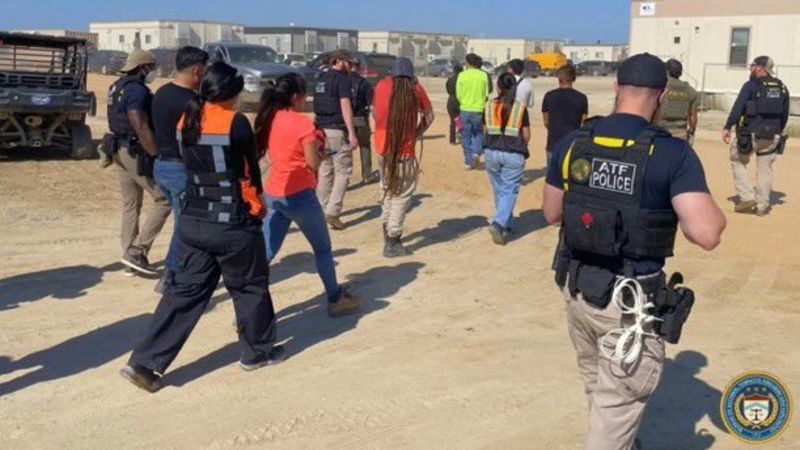Hundreds of federal officers descended on a small southeast Georgia community and raided the Hyundai Metaplant – arresting 475 people in the largest sweep yet in the current Trump administration’s immigration crackdown at US worksites.
Previously, federal officials estimated 450 people were apprehended Thursday at the enormous site in Ellabell, about 25 miles west of Savannah, Georgia.
The majority are Korean nationals, said Steven Schrank, a Homeland Security Investigations special agent in charge. Schrank said he did not have a breakdown of the arrestees’ nationalities.
All 475 people taken into custody were suspected of living and working illegally in the US, Schrank said. Some crossed into the US illegally; some had visa waivers and were prohibited from working; and some had overstayed their visas, he said.
During the raid, several people tried to flee – including some who “ran into a sewage pond located on the premises,” the US Attorney’s Office for the Southern District of Georgia said.
“Agents used a boat to fish them out of the water. One of the individuals swam under the boat and tried to flip it over to no avail. These people were captured and identified as illegal workers.”
Schrank noted that some of the workers may have been contractors or subcontractors.
“We continue to work on the investigation of who exactly worked for what companies,” he said.
A Hyundai spokesperson told CNN he does not believe anyone arrested was a direct employee of Hyundai Motor Company.
“We are aware of the recent incident at the HL-GA Battery Company construction site in Bryan County, Georgia. We are closely monitoring the situation and working to understand the specific circumstances,” spokesperson Michael Stewart said Friday.
“As of today, it is our understanding that none of those detained is directly employed by Hyundai Motor Company. We prioritize the safety and well-being of everyone working at the site and comply with all laws and regulations wherever we operate.”
The sprawling, 2,900-acre Hyundai Metaplant has two parts: a Hyundai electric vehicle manufacturing site, and an EV battery plant that’s a joint venture between Hyundai and LG.
The raid halted construction of the EV battery plant, The Associated Press reported.
LG did not respond to CNN’s questions about how many arrested workers may have been employed by the company, and how many may have been contractors or subcontractors for LG.
But the company sent the following statement to CNN:
“We are closely monitoring the situation and gathering all relevant details. Our top priority is always ensuring the safety and well-being of our employees and partners. We will fully cooperate with the relevant authorities.”
How the Georgia raid happened
“This was not an immigration operation where agents went into the premises, rounded up folks and put them on buses,” Schrank said.
“This has been a multi-month criminal investigation where we have developed evidence, conducted interviews, gathered documents and presented that evidence to the court in order to obtain judicial search warrants.”
At the Georgia site, masked and armed agents gave orders to construction workers wearing hard hats and safety vests as they lined up while officers raided the facility, video footage obtained by CNN showed.
ICE and Homeland Security Investigations were accompanied by the Georgia State Patrol, the FBI, DEA, ATF and other agencies in executing a search warrant.
“Together, we are sending a clear and unequivocal message: those who exploit our workforce, undermine our economy, and violate federal laws will be held accountable,” the Department of Homeland Security said in a statement.
While the raid is part of an ongoing investigation, “No charges have been filed, so that means that no wrongdoing is being accused at this time,” Schrank said.
Republican Gov. Brian Kemp has touted the Hyundai Metaplant as a boon for the Georgia economy.
In 2022, Hyundai announced an agreement with the state of Georgia to build Hyundai’s “first dedicated fully electrified vehicle and battery manufacturing facilities in the United States” in Bryan County, the company said.
The Metaplant was expected to create 8,500 jobs.
“With the first 500 employees trained, and more soon to join them, this is another major milestone as we continue our momentum towards the full opening of the Hyundai Metaplant!” Kemp posted on social media last year.
Kemp’s office issued a statement Friday in response to the raid.
“In Georgia, we will always enforce the law, including all state and federal immigration laws,” a Kemp spokesperson said. “The Department of Public Safety coordinated with ICE to provide all necessary support for this operation, the latest in a long line of cooperation and partnership between state law enforcement and federal immigration enforcement.”
South Korea says it’s concerned
In a televised statement Friday, a spokesperson for Korea’s Foreign Ministry said “many of our nationals were detained” in the raid, according to a translation from Reuters.
“The economic activities of our companies investing in the United States and the interests of our citizens must not be unduly violated during the course of US law enforcement,” spokesperson Lee Jae-woong said.
“In Seoul, we also conveyed our concerns and regret through the US Embassy today, urging special attention to ensure that the legitimate rights and interests of our citizens are not violated.”
CNN has reached out to the South Korean consulate in Atlanta and the embassy in Washington, DC for comment.
Dozens apprehended in New York, too
On the same day as the Georgia raid, dozens of workers at a family-owned plant that makes nutrition bars were also apprehended during an ICE raid, officials said.
Federal agents arrived at the Nutrition Bar Confectioners plant in Cato and questioned “virtually the entire workforce,” according to Rural & Migrant Ministry, whose staff witnessed the raid.
The group posted a video on its Facebook page showing law enforcement leading people into a van marked “Border Patrol.” During the raid, workers were taken into the kitchen area of the plant and “questioned one by one over the course of many hours,” the group said in the post.
The group estimates that “upwards of 70 employees” were questioned and “nearly all” were then arrested and taken to the nearby Oswego Detention Center. A spokesperson for the group told CNN they’re still waiting to hear from authorities about exactly how many were detained.
New York Gov. Kathy Hochul condemned the ICE operation in her state.
“I am outraged by this morning’s ICE raids in Cato and Fulton, where more than 40 adults were seized — including parents of at least a dozen children at risk of returning from school to an empty house,” Hochul said in a statement.
Hochul said such operations “will not make New York safer” and will “shatter hard-working families who are simply trying to build a life here.”
ICE confirmed to CNN affiliate WSTM that it carried out a “court-authorized enforcement action” in Cato. Employees told WSTM that around 60 workers were detained. CNN has reached out to the agency for further details.
Mark Schmidt, the owner of Nutrition Bar Confectioners, told the New York Times that all his workers had legal documentation to work in the US. “We’ve done everything we can to vet people we hire,” he said.
Schmidt described the ICE raid as “overkill.” His son Lenny Schmidt, the company’s vice president, told the Times the scene was “almost theatrical,” describing police dogs and all-terrain vehicles involved in the operation.
“It could have been handled so much more humanely and decently,” he said. “This kind of raid, you feel like it’s a drug bust or a human trafficking situation.”
CNN has reached out to the company for further comment.
The New York and Georgia raids come as Chicago leaders are preparing for a possible National Guard deployment in step with an expected immigration enforcement operation in the city.








